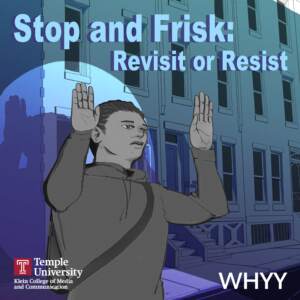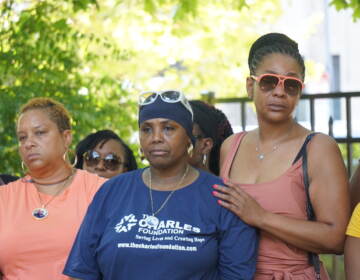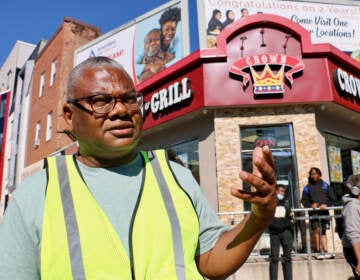Introducing ‘Stop and Frisk: Revisit or Resist’
A new podcast from WHYY and Temple University’s Logan Center for Urban Investigative Reporting looks at the controversial policing practice stop and frisk.
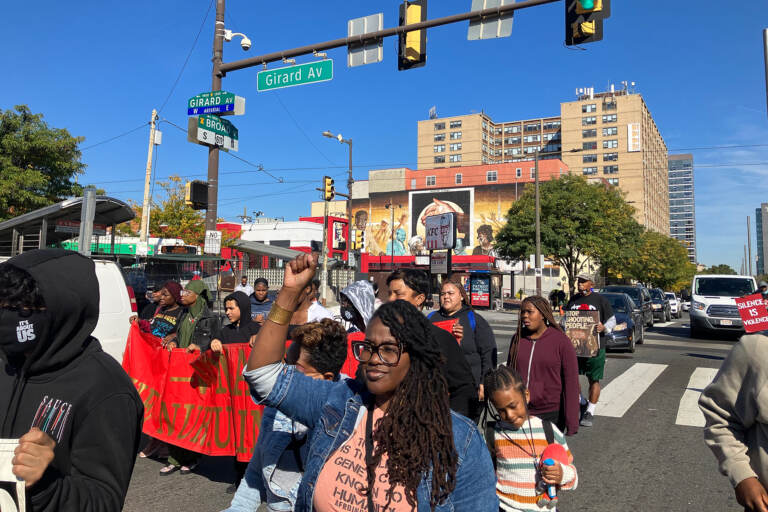
Rahnda Rize, Philadelphia activist and performing artist, participates in the Million Kid March from North Philadelphia to City Hall on Oct. 15.(Sammy Caiola/WHYY)
This story is from Stop and Frisk, a podcast production from WHYY News and Temple University’s Logan Center for Urban Investigative Reporting
Find it on Apple Podcasts, Spotify, or wherever you get your podcasts.
Philly native and activist Reneé Glover was among dozens of Philadelphians who marched down Broad Street with signs reading “Stop Killing Us” and “Our Kids’ Lives Matter” on a sunny Saturday last month.
Chants to “put the guns down” rang out as the group strode toward City Hall.
“We’ve gotta get our streets back,” Glover said as she walked her young grandchildren through the crowd. “We marchin’ cause we need to get rid of these guns …These kids are out here just killin’ each other.”
The Million Kid March is just one of the many grassroots anti-gun violence events that happen regularly across Philadelphia. The marchers were mothers, fathers, coaches, teachers, and pastors – many of whom have experienced the ripple of trauma that follows the fatal shooting of a child.
“We need our kids to grow old,” said organizer Rowena Faulk. “I’m 59 now, they’re not making it to 29. And, we have to put a stop to that.”
Released earlier this year, the 100 Shooting Review Committee report was part of a multi-agency effort to address increasing homicides and gun violence. The report underscores the problem as a “racial justice crisis” that disproportionately impacts Black communities in terms of victims and offenders. Since 2015, roughly 80% of shooting victims and shooting-related arrests have been Black men, mostly ages 18-35.
Getting guns off the streets is one of the changes Philadelphians have been pleading for since the city’s staggering spike in fatal shootings between 2019 and 2020. Most of the killings were concentrated on 57 blocks in largely Black and historically-redlined areas of North and West Philly.
The number of shootings continues to climb, and residents want action. So much so that some are asking whether “stop and frisk,” a controversial policing practice with a history of hassling and harming Black men, could restore a long-lost sense of safety. City council president Darrell Clarke floated the idea at a July city council meeting about the gun violence crisis.’
“When are we going to look at stop and frisk in a constitutionally enacted way?” he said.
That’s why WHYY News and Temple University’s Logan Center for Urban Investigative Reporting are collaborating on “Stop and Frisk: Revisit or Resist,” a new podcast about the search for solutions to Philadelphia’s rising gun violence. Yvonne Latty, director of the Logan Center, and Sammy Caiola, WHYY’s gun violence prevention reporter, reported throughout the city and spoke with residents, politicians, law enforcement officers, and legal experts about stop and frisk’s fraught history and how politicians and community leaders got to the point of considering it again.
Read about the podcast’s five episodes below.
1. How did we get here?
“Stop and frisk” reemerged in public conversations in July 2022, when city council president Darrell Clarke surfaced the idea days after a Fourth of July shooting on the Benjamin Franklin Parkway. Some council members voiced support, while others called it a desperate attempt to resurrect a failed policy. We examine how Philadelphians feel about gun violence in their neighborhoods and what they think about revisiting stop and frisk as a solution.
2. The Targets
Many older, Black Philadelphians say they feel unsafe in their neighborhoods, and they’re calling for stop and frisk as a way to restore a sense of lawfulness. Meanwhile, some young Black men who are most likely to be targeted by the practice are terrified that stops will escalate to police brutality. We unpack the fear and trauma that young Black men in Philadelphia may experience on a daily basis, and how it contributes to the cycle of violence.
3. The Police
Central to the question of solving Philadelphia’s gun violence crisis is the role that law enforcement plays in the most affected neighborhoods. The city allocates more funding toward policing every year, but the homicide numbers haven’t budged. Some politicians advocate for community policing, a strategy that emphasizes officers partnering with neighborhood organizations to improve safety and encourage people to cooperate with criminal investigations. However, some feel the relationship between residents and cops is too broken to repair.
4. Political will
Stop and frisk is a polarizing topic and sparks debate in Philadelphia. Gun violence is bound to be a major talking point in the upcoming 2023 mayoral election, and candidates will be pressured to take a stance on the policing practice. Meanwhile, residents continue to take to the streets to decry the lack of coordination between the police department, city hall, the district attorney’s office and community organizations tackling the crisis.
5. What happens next
Even as the debate over policing continues, many residents are calling for gun violence solutions outside of law enforcement. This episode gathers community leaders, clinicians and young people to discuss how combating poverty, teaching conflict resolution and providing jobs, as well as improving education, mental health assistance and neighborhood conditions, could help reduce shootings in Philadelphia.
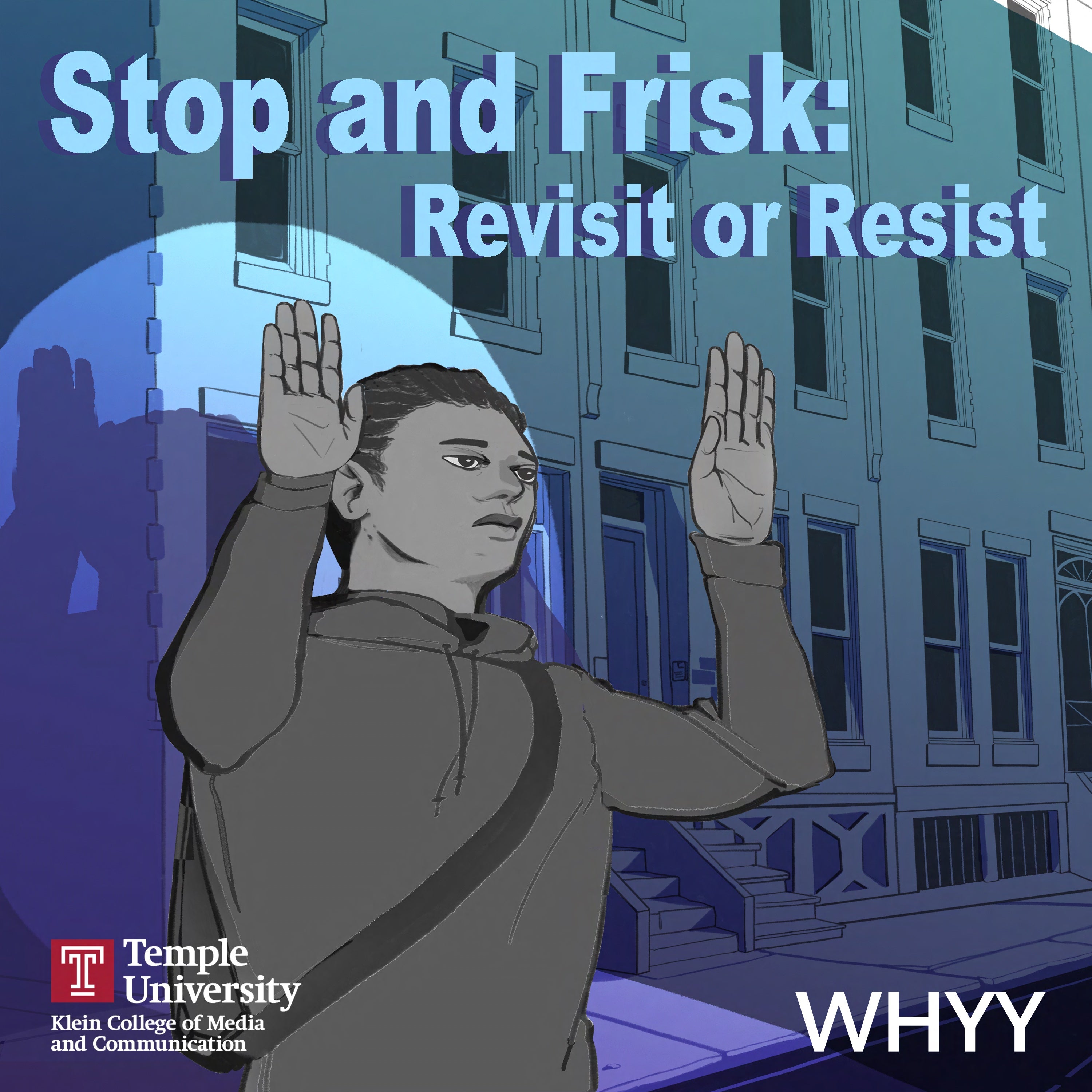
Stop and Frisk: Revisit or Resist
WHYY is your source for fact-based, in-depth journalism and information. As a nonprofit organization, we rely on financial support from readers like you. Please give today.


